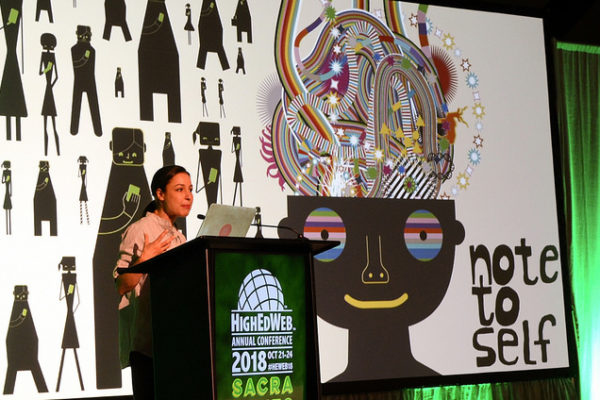Entrepreneur, author, podcaster, and journalist Manoush Zomorodi is on a mission to make technology more relatable. And she brought it to HighEdWeb in Sacramento.
“I want to empower people to understand technology to the point where they feel like they have autonomy over it,” she said in a talk that dove into some of her most noteworthy projects.
Manoush’s work, first with WNYC’s Note to Self and now with Stable Genius Production (co-founded with former WYNC producer Jen Poyant) examines the intersection of humanity and technology. In 2017 she published her book, Bored and Brilliant: How Spacing Out Can Unlock Your Most Productive and Creative Self.
Manoush found an excited and receptive audience.
Excited to hear from Manoush Zomorodi! #heweb18 @manoushz pic.twitter.com/8Eo8qqAaVJ
— Alina Nevins (@AlinaNevins) October 22, 2018
Every day feels like an experiment. @manoushz on tech #heweb18
— Becca Is Editing (@BeccaIsEditing) October 22, 2018
Doing “nothing” and letting your mind wander is when you create the story of yourself. @manoushz #heweb18
— Becca Is Editing (@BeccaIsEditing) October 22, 2018
“We can’t tap that awesome brain power if we’re busy tapping our screens.” @manoushz #heweb18
— Chris D’Orso (@cdorso) October 22, 2018
Technology isn’t all bad. Some of it is awesome. But we need to make sure the tech stays a tool, not a taskmaster. @manoushz #heweb18
— Teenerd (@tinaburnell) October 22, 2018
In 2015, Manoush and the Note to Self team launched the “Bored and Brilliant” project. That was followed in 2016 by “Infomagical” and then in 2017 by ”The Privacy Paradox.” Each research project was designed to highlight how participants interact with technology and, possibly, inspire them to change their behaviors.
Do not give your phone the power to decide what you should be doing with it. We need to make sure the tech stays a tool and not a taskmaster. @manoushz #heweb18
— Alexandra Simone (@reeltake) October 22, 2018
FOMO is for losers. #heweb18 #hewebgold
— Lisa Nguyen (@lmwst36) October 22, 2018
Tech literacy is interdisciplinary. It is life. @manoushz #heweb18
— Teenerd (@tinaburnell) October 22, 2018
“Studies find that even when we think the risk to our data and identity is high, we sign up anyway.” #theprivacyparadox #heweb18 @manoushz
— Martin Sickafoose (@mar10s) October 22, 2018
At one point in her talk, Manoush discussed President Donald Trump and his often controversial use of social media. She said he has prompted conversations about what it means to be a citizen, tested Silicon Valley’s utopian belief that technology is a force for good, and emphasized that democratic ideals are at stake.
“Teachers are having to teach human things like how to have a conversation or make eye contact” – @manoushz Wow. #heweb18
— Aaron Rester (@aaronrester) October 22, 2018
The Silicon Valley myth that technology always represents progress is being tested. The future of our democracy is at stake. — @manoushz #heweb18
— LoriPA @ #heweb18 (@LoriPA) October 22, 2018
Manoush pointed out that companies such as Apple and Google are including tools in their phones to help, such as features that track phone use. But she wondered if they would work as intended.
“Do we really need more tech to help us with our tech addiction?” – @manoushz #heweb18
— Aaron Rester (@aaronrester) October 22, 2018
Manoush ended her keynote by looking into the future.
“Algorithms and machines are going to make a lot of decisions for us in the near future,” she said. “But we still need to look after each other.”
If you missed the @manoushz keynote 👏🏼 at #heweb18, then you you’ll probably develop a healthy #fomo for the rest of the @HighEdWeb 2018 conference 😜 pic.twitter.com/ZbOdA29Dnb
— Robin Hood North (@robinhoodnorth) October 22, 2018
Blown away by keynote speaker @manoushz , let’s keep these important conversations about our relationship with tech & mindful consumption going, ugh LOVE her! #heweb18 ✨🙏✨ pic.twitter.com/y5Har0KDDx
— Rebecca Stapley (@rstapley) October 22, 2018

